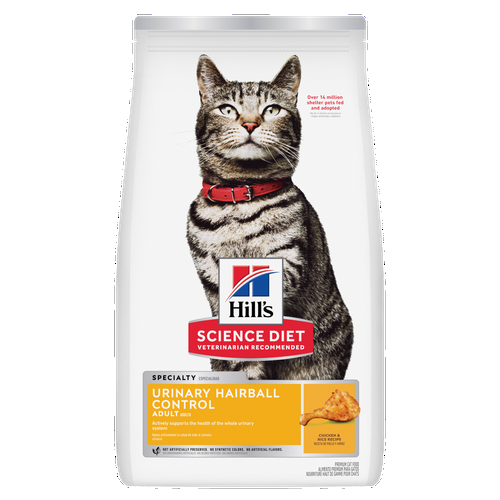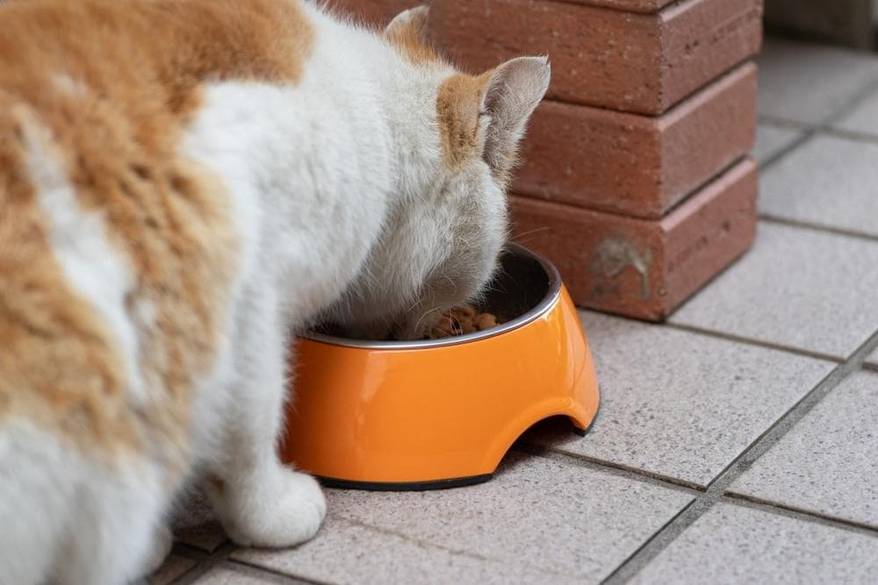
-
Find the right food for your petTake this quiz to see which food may be the best for your furry friend.Find the right food for your petTake this quiz to see which food may be the best for your furry friend.Featured products
 Hill's Science Diet Adult Oral Care Chicken, Brown Rice & Barley Recipe Dog Food
Hill's Science Diet Adult Oral Care Chicken, Brown Rice & Barley Recipe Dog FoodClinically proven kibble technology to reduce plaque & tartar build-up
Shop Now Adult Small & Mini Lamb Meal & Brown Rice Recipe Dog Food
Adult Small & Mini Lamb Meal & Brown Rice Recipe Dog FoodFor the faster metabolism of Small & Mini dogs
Shop Now Adult 7+ Small & Mini Chicken & Brown Rice Recipe Dog Food
Adult 7+ Small & Mini Chicken & Brown Rice Recipe Dog FoodFor the unique nutritional needs of mature Small & Mini dogs
Shop NowFeatured products Adult Indoor Chicken Recipe Cat Food
Adult Indoor Chicken Recipe Cat FoodSupports energy level and beautiful fur in indoor cats
Shop Now Hill's Science Diet Adult Sensitive Stomach & Skin Dog Food
Hill's Science Diet Adult Sensitive Stomach & Skin Dog FoodHighly digestible recipe, gentle on stomachs. Nourishes skin & promotes a lustrous coat
Shop Now Adult Urinary Hairball Control Chicken & Rice Recipe Cat Food
Adult Urinary Hairball Control Chicken & Rice Recipe Cat FoodActively supports the health of the whole urinary system
Shop Now -
Featured articles
 My Pet Ate a Lizard — What Should I Do?
My Pet Ate a Lizard — What Should I Do?Learn what to do if your pet eats a lizard, including whether they can be toxic and symptoms to keep an eye on when they've swallowed one.
Read More Easy DIY Dog & Cat Toys: Nine of Our Favorites
Easy DIY Dog & Cat Toys: Nine of Our FavoritesBrowse this comprehensive guide for several of our favorite DIY dog and cat toys that are sure to put a little pep in your pet's step.
Read More 15 Pet-Friendly Cities Ideal for a US Road Trip
15 Pet-Friendly Cities Ideal for a US Road TripCheck out our list of pet-friendly U.S. cities that are excellent travel options, offering off-leash dog parks and pet-friendly restaurants & hotels.
Read More -


As any pet parent knows, one of life's simple pleasures is petting your cat. But if they have sensitive skin, that simple pleasure might not be so pleasant for either of you. If you notice something's up with your cat's skin or coat, make an appointment with your veterinarian to determine the cause and restore your cat's skin health.
In the meantime, here's what you should know about cat sensitive skin treatment, causes and signs and how to support your feline friend so they can feel better quickly.
What Cat Sensitive Skin Looks Like
Your cat's skin is an essential organ, serving as a protective barrier to the environment. However, allergic dermatitis (skin allergies) and other irritating factors, such as parasites, can compromise cat skin health. When your cat's skin barrier is damaged, it can cause discomfort and make them more vulnerable to infections and the outside world.

Signs of Skin Allergies and Diseases
Cats can be allergic to certain ingredients in food; environmental factors like pollen, dust or mold; or flea or mosquito bites. Signs of skin conditions can include:
Excessive chewing, licking or scratching (overgrooming), especially at the head and neck
Hair loss or bald patches
Thickened skin, scabs or crusty spots under the fur
Flaky, scaly patches under the fur
Redness, swelling or bumps
Strong odor
Other Signs of Skin Concerns
In some cases, your cat may not be allergic to anything at all. Their skin may just require a little extra care to look, feel and function at its best. Any skin that's not in peak condition can be considered sensitive. Here are some signs that something's amiss:
Greasy fur
Dandruff flakes
Dull, lifeless coat
Cat Sensitive Skin Treatment: What Can You Do?
Start With a Veterinarian Visit
If you notice any signs of trouble with your cat's skin or coat, make an appointment with your veterinarian. Some signs of sensitive or compromised skin can indicate an underlying disease, such as thyroid disease or diabetes. Regardless of the cause, getting a proper diagnosis from your vet is essential to effective treatment.
Check for (and Prevent) Pests
Thoroughly examine your cat's coat and skin for ticks, fleas, mites, lice or other parasites before your vet visit. Ask your veterinarian about preventive treatments to help keep pests at bay.


Tasty Tips
Ask About Allergies
Skin allergies cause inflammation that results in licking, scratching, hair loss and dry, flaky skin. Your vet will ask you about your cat's routine, food and home environment; perform a full-body exam; and recommend blood or skin tests if necessary to help determine the cause. Treatment may include oral and topical medications, from antihistamines to shampoos, depending on the cause of your cat's allergies.
Feed Your Cat Well
What your cat eats plays a large role in their skin health. Even if the cause of their skin condition isn't related to nutrition, start by feeding your cat a complete and balanced food for their life stage.

How Nutrition Can Support Cat Sensitive Skin
Feeding your cat a complete and balanced food designed to support sensitive skin can help them look and feel their best. Your vet may suggest a food formulated for skin sensitivity or made without certain ingredients if an ingredient allergy is to blame for your cat's sensitive skin.
Here are some common features of foods that support skin health:
Antioxidants, including vitamin C, vitamin E and beta-carotene, to support immune system health and protect your cat from free radical cellular damage
High-quality protein and essential amino acids to provide key building blocks for skin
Omega-6 and omega-3 fatty acids (often found in fish oil) to support healthy skin and coat
Caring for Your Cat's Largest Organ
Supporting your cat's sensitive skin can be as simple as providing a quality, complete and balanced food. In other cases, getting your cat back to their best self may require medication, preventive treatment or changes in grooming. Your veterinarian can help you design an appropriate approach for your cat's needs. Together, you can watch your furry friend look and feel better, which is rewarding for everyone involved. Cat sensitive skin treatment doesn't have to be complicated. With a little support, the rewards are easy to see and feel!


Dr. Karen Louis owns her low stress veterinary clinic near St. Louis. When she's not helping dogs and cats live their best lives, she maintains her blog, VetChick.com, and is an award winning nature photographer.
Related products
Related articles

Put your cat on a diet without them knowing
Our low calorie formula helps you control your cat's weight. It's packed with high-quality protein for building lean muscles, and made with purposeful ingredients for a flavorful, nutritious meal. Clinically proven antioxidants, Vitamin C+E, help promote a healthy immune system.
Put your cat on a diet without them knowing
Our low calorie formula helps you control your cat's weight. It's packed with high-quality protein for building lean muscles, and made with purposeful ingredients for a flavorful, nutritious meal. Clinically proven antioxidants, Vitamin C+E, help promote a healthy immune system.

